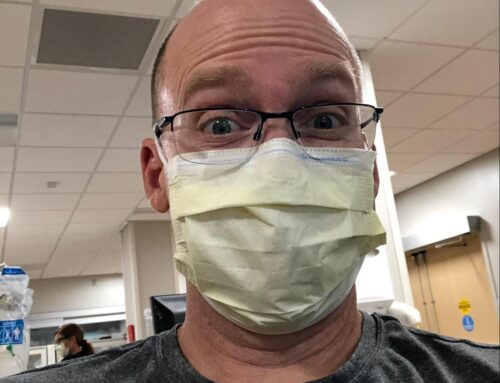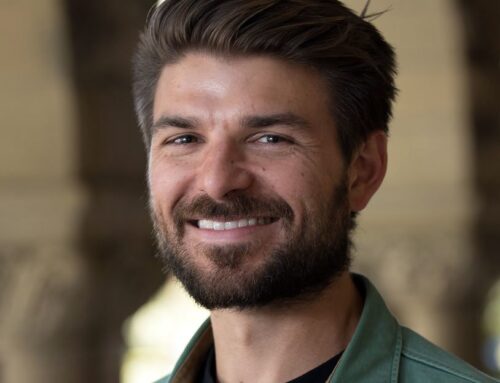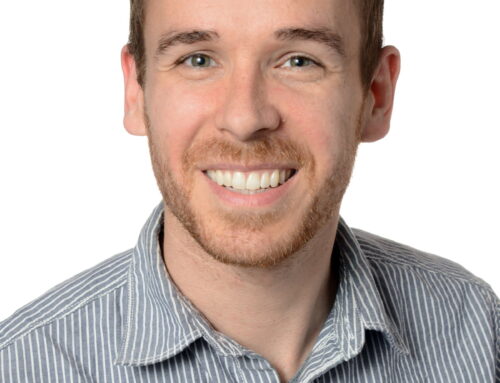Dr. Rowe is an emergency physician practicing at the University of Alberta. Having worked in different departments and taken on a number of different leadership roles, Dr. Rowe has certainly figured out a way to keep healthy and stay well. Having been an avid soccer player in the past, he continues to keep up his fitness, by incorporating activity into his daily routine. Keep reading to check out his wellness pearls! Here’s how he stays healthy in EM!
- Name: Brian H. Rowe, MD, MSc, CCFP(EM), FCCP

- Nicknames: High school: “Dude”; University: “Disco”; Now: “Bro” (as in BRowe)
- Location: Edmonton, Alberta, Canada
- Current job(s): Professor, Department of Emergency Medicine, University of Alberta; Clinician, Emergency Department, University of Alberta Hospital; Scientific Director, Institute of Circulatory and Respiratory Health, CIHR; Scientific Director, Emergency Strategic Clinical Network, Alberta Health Services.
- One word that describes how you stay healthy: Family/Friends
- Primary behavior/activity for destressing: Cycling and swimming.
What are the top 3 ways you keep healthy?
It has changed over time. Early in my career, I cycled distances, participated in marathons and triathlons, and played competitive soccer. In fact, I met my wife of 25 years playing competitive soccer for the Italian Flyers, in Sudbury, Ontario. As my life changed and we had two sons, I continued to play recreational soccer (my team was called the Buttercups, enough said?); however, I spent more time coaching youth soccer. As my sons grew up, I focussed less on team sports and more on cycling, hiking, and spending time with my family outside of sports. We enjoy arts and entertainment, the odd Oiler’s hockey game, travel, and the occasional NetFlix show now! The important thing is to be flexible.
What’s your ideal workout?
Cycling to and from work.
Do you track your fitness? How?
I do not track my fitness; I can tell when the hills don’t “hurt” as much.
How do you prepare for a night shift? How do you recover from one?
I don’t do night shifts. Back in the day, when I was working in a busy, regional trauma centre in Sudbury, nights were what I had to do for ~9 years to be able to “afford” to do research. When I accepted an academic position at the University of Alberta, there wasn’t a need for me to do “overnight” shifts. They were lucrative, we had younger staff who preferred them, and so I quickly bowed out. I will say, however, I am still often in the department until the early morning hours! I sleep best after working a late clinical shift!
How do you avoid getting “hangry” (angry due to hunger) on shift?
I used to just power through shifts, with absolutely no plan for sustainability. That was a huge mistake. Dr. Greg Mosdossy (now in London, ON) was one of my colleagues who always came to work prepared for the long haul with vegetables, a sandwich, and something to drink. Almost always now, I “try to be like Mos” and bring legitimate food and things to snack on. Nobody in the work place works without a break as long and as hard as emergency physicians – we need to change that. More importantly, avoid doughnuts, chips, cakes, and candies while on shift!
How do you ensure you are mentally in check?
Emergency medicine is action-packed, and one needs to be on their “game” when working. I don’t know how to explain it, but you need to get in the zone, focus on the needs of the patients, and forget your own stressors. If you cannot, the ED group needs to recognize this, help you, and give you time to heal. Nobody can avoid stress in life, serious life events, and personal problems. One of the most gratifying aspects of my career has been the compassion shown to me by my colleagues. For example, when my father died, when one of my closest friends died, and also more recently when my mother died, my groups rallied around me, gave me the release time I needed, and I really appreciated their thoughts and well-wishes. Moreover, I make every effort I can to do the same for the group members in their times of need.
What are the biggest challenges you face in maintaining a longstanding career in EM? How do you address these challenges?
Challenge: Keeping up to date in the changing landscape of emergency medicine.
Solution: Participating in research and an academic life allows me to work in an environment where I am stimulated, surrounded by some of the best minds in medicine, and where learning occurs regularly.
Challenge: Life balance.
Solution: a GREAT partner, a life outside of medicine, and good friends.
Best advice you have received for maintaining health?
- Dr. Larry Thorsteinson, Emergency Physician and friend from Sudbury, ON: Take time every 6 weeks and 3-months to spend time away from work, go on a holiday, and forget about your job(s). I haven’t always been able to do this; however, we have tried!
- “Let’s go for a walk/ride”. Katharyn Webb; wife, life partner and best friend.
- “Hey dad, when are you coming home to play”: telephone calls from my sons, Stewart Richard (now 21) and/or Bradley Keith (now 24) when they were youngsters. I suspect my bride may have put them up to it!
Who would you love for us to track down to answer these questions?
Howard Ovens
Michael Schull




